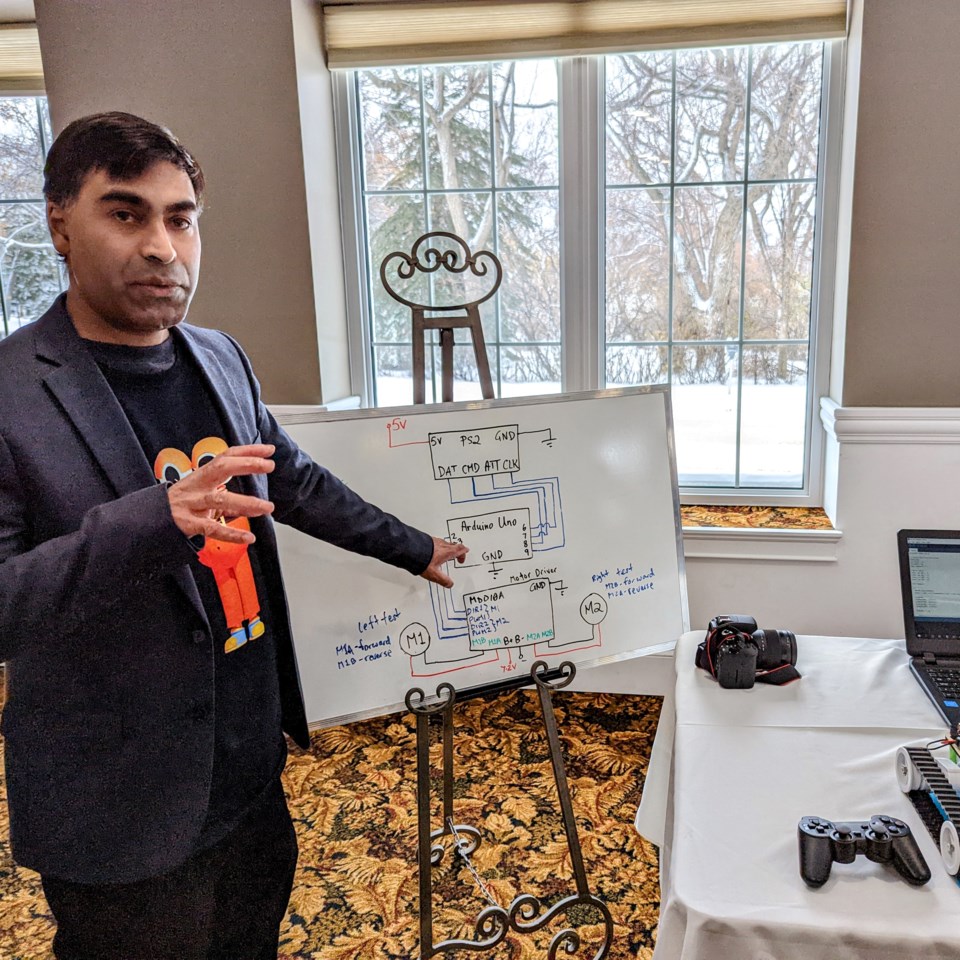MOOSEJAWTODAY.COM — With the rise of OpenAI's ChatGPT dominating headlines, there is a lot of confusion about what AI is, how it should be used, or whether it poses a threat or an exciting new frontier, and Shaun Nanan, a computer engineering professor at Sask Polytech Moose Jaw, is eager to clarify the subject in layman's terms.
Nanan is passionate about the intersection of education with technology. He recently founded the Nanan STEM Academy, which his own children attend and which offers students a dramatic leg up in learning about the past, present, and future of technologies like coding, 3D printing, AI, robotics, and logical thinking.
He holds credentials as an Applied Science Technologist and Professional Engineer in the field of Electrical Engineering Technology and Electronic Systems Engineering, and started teaching in the Computer Engineering Technology department at Sask Polytech in 2011. He became Program Head of the department in 2017, and in 2023 he became an Academic Chair. He also serves as a Technical Committee Member for Skills Canada.
What are the dangers?
"There's certainly risks to any new technology," Nanan told MooseJawToday.com. "ChatGPT is one of the most popular right now, and if you've tried using it, you know it's pretty good at answering questions. It uses deep learning algorithms to produce a response, but sometimes the information can be false or biased, and currently there's no accountability.
"I would think, coming up in the future here sooner than later, there will government regulations or some type of industry regulations to safeguard the public. I think education is kind of the most important thing here."
Nanan said that Artificial Intelligence is a tool designed to increase human productivity. Tools can be used for negative and positive ends, and it's the job of the user to educate themselves on the ethical, legal, and cultural concerns raised by new technologies.
However, the effects of AI reach far beyond its direct users to affect people who may not know anything about it. A major concern over the rise of new AI tools is the perpetuation of digital scams through social media, for example.
As of the past couple of years, AI tools can accurately replicate the voice and appearance, in both photo and video formats, of literally anyone. Stories now circulate of grandparents picking up the phone to hear the desperate voice of a loved one begging for financial help — only it isn't their grandchild at all.
Other scammers have been discovered using chatbots to befriend children online and trick them into revealing personal information.
Until regulations are developed and enforced, the only way for digital citizens to protect themselves is to know how to independently fact-check the information they see, safeguard private information with things like long passwords and two-factor authentication, or recognize the signs of a phishing email.
Parents, too, will need to know the basics in order to protect and educate their children.
"Digital citizenship is going to be a major topic in schools and for the public," Nanan said. "I refer to that as a new paradigm of education."
As an educator, Nanan is responsible for aligning program development with the future of work. His industry contacts, program advisory committees, and personal research all agree: Future workers will need to be experts at critically filtering information from the internet, understanding cybersecurity, and controlling their personal data, skills which also protect employers.
What are the opportunities?
"We've been using AI for a long time. One of the earliest forms is the spell-checker, which was actually developed in the '70s," Nanan explained. "When it was first released, people were just absolutely amazed, but today we don't think twice about it, unless it isn't working properly. Now, we have tools for grammar checking, too."
Other examples of AI-powered tools include GPS navigation apps, healthcare diagnostic tools, robotics and automation in manufacturing, robot vacuums and personal digital assistants like Siri and Alexa, the development of new pharmaceuticals, internet search engines, social media prediction algorithms, and much, much more.
"Your behavioural patterns are monitored online by AI tools right now, and that's something else that's been out for a while," Nanan said. "But as we continue evolving in technology, we will have even more tools using machine learning, automation, and smart systems.
"I believe AI tools needs to be embraced. ... AI cannot replace human creativity and imagination. You can ask ChatGPT to write lyrics to a rap song, but it's not Kendrick Lamar.
"Essential skills of a human are required to solve the world's problems, which is necessary for the future of work. AI is a tool that increases productivity; it is used to create the pieces of the puzzle that we use to create the bigger picture. In the future, there will be an amalgamation between human and machine. ... Think about AI in agriculture — automated farming, for example. This will be big in Saskatchewan."
Nanan has integrated ChatGPT into his STEM Academy. An AI-powered chatbot called InstructorGPT takes advantage of the latest tech's ability to write and modify code and check errors. It can then provide personalized feedback and suggestions for each student. With guidance and supervision by teachers who understand the technology's risks and limitations, this gives students a headstart in the safe use of AI — and in becoming confident, competent digital citizens.
Learn more at nananacademy.com/instructorgpt-an-evolving-paradigm-of-education.
In response to some providers blocking access to Canadian news on their platforms, our website, MooseJawToday.com will continue to be your source for hyper-local Moose Jaw news. Bookmark MooseJawToday.com and sign up for our free online newsletter to read the latest local developments.




